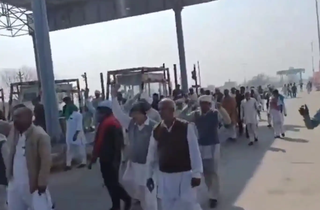On Sunday, farmer unions held seminars at the Khanauri and Shambhu border crossings, specifically focusing on the policies of the World Trade Organization (WTO). This activity precedes the 13th WTO Ministerial Conference taking place in Abu Dhabi from February 26th to 29th, which a delegation from India led by Commerce and Industry Minister Piyush Goyal will be attending.
Jagajit Singh Dallewal, President of the Bharti Kisan Union Ekta Sidhupur, expressed concerns about the WTO's impact on Indian farmers, claiming its policies are detrimental to their livelihood. He emphasized the need to remove the agricultural sector from the WTO agreement, arguing for continued government support through minimum support prices (MSPs) and subsidies.
Dallewal further highlighted the disparity in agricultural subsidies between countries, stating that some nations offer farmers subsidies of around Rs 80 lakh (US$100,000) per person, compared to the comparatively meager Rs 27,000-28,000 (US$340-350) received by Indian farmers. He also questioned the possibility of further talks with the central government, stating they haven't received any proposals for a fifth round of discussions.
Dallewal reiterated the farmers' rejection of the government's proposal for a five-year plan regarding MSPs on specific crops, demanding MSPs be applied to all 23 crops. He also condemned the recent violence between farmers and security forces in Haryana, suggesting it highlights how the movement extends beyond Punjab and represents a broader struggle for all Indian farmers.
Dallewal criticized the government, accusing them of attempting to silence dissent and suppress opposing voices. He acknowledged ideological differences within the Samyukta Kisan Morcha (SKM) leadership, attributing the recent split in the group to communication challenges during their earlier separation.
While the farmers' march to Delhi has been postponed, their continued protests and focus on influencing the WTO meeting demonstrate their unwavering commitment to their demands for agricultural reform and improved government support. (ILKHA)



 Güncel
Güncel
 Dünya
Dünya
 Dünya
Dünya
 Dünya
Dünya
 Dünya
Dünya
 Dünya
Dünya
 Dünya
Dünya
 Dünya
Dünya
 Dünya
Dünya
 Dünya
Dünya





